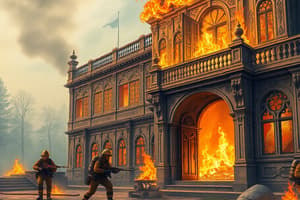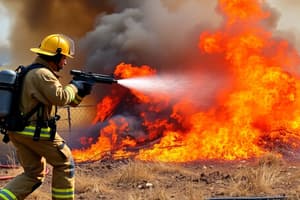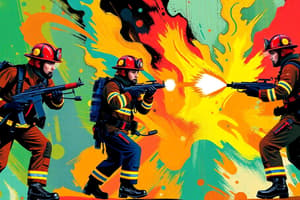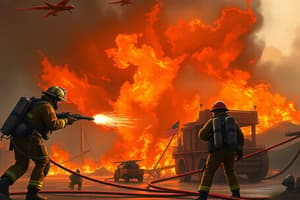Podcast
Questions and Answers
What are the two main fireground strategies used at structure fires?
What are the two main fireground strategies used at structure fires?
- Proactive and Reactive
- Offensive and Defensive (correct)
- Direct and Indirect
- Emergency and Non-emergency
Who is responsible for determining the appropriate fireground strategy?
Who is responsible for determining the appropriate fireground strategy?
- The Fire Marshal
- The Safety Officer
- The Chief of Operations
- The Incident Commander (correct)
Which of the following does NOT influence the choice of fireground strategy?
Which of the following does NOT influence the choice of fireground strategy?
- Fire load
- Weather conditions (correct)
- Type of construction
- Structural integrity
What must the Incident Commander ensure after initiating the fireground strategy?
What must the Incident Commander ensure after initiating the fireground strategy?
Why should simultaneous Offensive and Defensive strategies in the same fire area be avoided?
Why should simultaneous Offensive and Defensive strategies in the same fire area be avoided?
At what point must fireground strategy be evaluated during an incident?
At what point must fireground strategy be evaluated during an incident?
What is a crucial factor for the Incident Commander to base the fireground strategy upon?
What is a crucial factor for the Incident Commander to base the fireground strategy upon?
What should be included in the on-scene report by the initial Incident Commander?
What should be included in the on-scene report by the initial Incident Commander?
What must be addressed before a fire can be considered under control?
What must be addressed before a fire can be considered under control?
What is the primary reason to operate in marginal fire situations?
What is the primary reason to operate in marginal fire situations?
What should command do when assessing a fire situation in isolated concealed spaces?
What should command do when assessing a fire situation in isolated concealed spaces?
Which of the following is NOT a variable relating to attack operations?
Which of the following is NOT a variable relating to attack operations?
When should command abandon a marginal attack?
When should command abandon a marginal attack?
What is a critical factor in planning an effective fire attack?
What is a critical factor in planning an effective fire attack?
Which situation would require an immediate defensive strategy over an offensive one?
Which situation would require an immediate defensive strategy over an offensive one?
Why is early identification and response crucial in concealed space fires?
Why is early identification and response crucial in concealed space fires?
What is the primary purpose of knocking down the main body of fire during an operation?
What is the primary purpose of knocking down the main body of fire during an operation?
What does 'fire under control' indicate in an incident?
What does 'fire under control' indicate in an incident?
When should Command notify dispatch that a primary search will not be completed?
When should Command notify dispatch that a primary search will not be completed?
What is the most effective tactic when exposure is severe and water is limited?
What is the most effective tactic when exposure is severe and water is limited?
What should Command do after declaring 'fire under control'?
What should Command do after declaring 'fire under control'?
What is the primary focus of an Offensive Fire Attack as outlined in the guidelines?
What is the primary focus of an Offensive Fire Attack as outlined in the guidelines?
Before initiating an Offensive Fire Attack, what must be determined about the structure?
Before initiating an Offensive Fire Attack, what must be determined about the structure?
What should be evaluated in the tactical analysis during a fire operation?
What should be evaluated in the tactical analysis during a fire operation?
How should command allocate personnel and resources at a fire scene?
How should command allocate personnel and resources at a fire scene?
What is the purpose of the IRIC team prior to entry in an Offensive Fire Attack?
What is the purpose of the IRIC team prior to entry in an Offensive Fire Attack?
What important factors must command consider regarding fire conditions?
What important factors must command consider regarding fire conditions?
What is a key aspect of engaging and fighting the fire during operations?
What is a key aspect of engaging and fighting the fire during operations?
What does the fireground strategy ensure among all firefighters on the scene?
What does the fireground strategy ensure among all firefighters on the scene?
What is the primary reason for not committing crews to the interior of a structure?
What is the primary reason for not committing crews to the interior of a structure?
Which action should be taken first when a defensive fire attack strategy is announced?
Which action should be taken first when a defensive fire attack strategy is announced?
What must Command do to ensure a safe operation when conditions are marginal?
What must Command do to ensure a safe operation when conditions are marginal?
What should be done with hose lines if retreat is unsafe due to them being a hindrance?
What should be done with hose lines if retreat is unsafe due to them being a hindrance?
In defensive fire operations, what is the order of priorities?
In defensive fire operations, what is the order of priorities?
What does the announcement of a change to a defensive strategy signify?
What does the announcement of a change to a defensive strategy signify?
Why is it essential to obtain a Personnel Accountability Report (PAR) after switching strategies?
Why is it essential to obtain a Personnel Accountability Report (PAR) after switching strategies?
What must Sector Officers do after a switch to a defensive strategy?
What must Sector Officers do after a switch to a defensive strategy?
Flashcards are hidden until you start studying
Study Notes
Fireground Strategy
- The purpose of this document is to outline a fireground strategy for use at structure fires.
- The strategy will be either Offensive or Defensive, based on a Risk Management Plan
- The Incident Commander chooses the strategy considering:
- Building type, condition, age, etc.
- Structural integrity
- Fire load
- Fire and/or smoke conditions
- Rescue potential
- The Incident Commander is responsible for determining the appropriate strategy.
- The Incident Commander must ensure all personnel operate within the chosen strategy.
- The Incident Commander must control the fireground strategy to provide overall incident scene safety
- Avoid simultaneous offensive and defensive strategies in the same fire area.
- Match the appropriate strategy to the fire conditions, minimizing risk to firefighters.
Offensive Fire Attack
- Only initiate when the structure is considered safe to enter.
- Offensive fire attacks are centered on RESCUE.
- Assign a IRIC team prior to entry.
- Direct initial attack efforts towards supporting primary search.
- The first attack line must go between the victims and the fire to protect avenues of rescue and escape.
- Determine fire conditions and extent before starting fire operations.
- Consider unburned portions of the building to anticipate fire spread and plan fire control activities.
- Consider the 7 sides (or sectors) of the fire: front, rear, both sides, top, bottom, and interior.
- Fires are not considered under control until all 7 sides are addressed.
- Open concealed spaces such as attics, ceiling areas, and construction voids.
- Initiate early ventilation in concealed space fires.
- Consider where the fire will be when attack efforts are ready to go into operation.
- Write off property that is already lost and protect exposed property based on the most dangerous direction of fire spread.
- Variables relating to attack operations involve:
- Location/position of attack
- Size of attack
- Support functions
Marginal Fire Attack
- Only operate in Marginal Situations for rescue.
- Marginal situations are when offensive/defensive conditions are unclear.
- Command must consider the 7 sides (or sectors) of the fire
- Command must initiate an offensive interior attack while setting up defensive positions on the exterior.
- Marginal attacks should be abandoned when:
- A primary all clear is obtained and the situation is still marginal.
- The roof is unsafe or untenable.
- Interior forces encounter heavy heat and cannot locate or make progress on the fire.
- Heavy smoke is being forced from the building under pressure and is increasing.
- Command must assign a Roof Sector as early as possible during marginal situations for rapid evaluation of roof conditions.
- Consider not committing crews to the interior of a structure unless the Roof Sector reports the roof is safe to operate on and under.
Defensive Fire Attack
- Defensive operations indicate that the offensive attack strategy has been abandoned due to personnel safety and the involved structure has been conceded as lost.
- The announcement of a change to a defensive strategy is made as Emergency Traffic.
- All personnel withdraw from the structure while maintaining a safe distance.
- Obtain a PAR (Personnel Accountability Report) after switching from offensive to defensive strategy.
- Interior lines are withdrawn and repositioned when changing to a defensive strategy.
- Retreat with hose lines, but if unsafe, abandon hose lines.
- Protect all exposures (both immediate and anticipated).
- Defensive operations priorities are:
- Personnel safety
- Exposure protection
- Knocking down the main body of fire.
- The most effective tactic for defensive operations is master streams.
- Once exposure protection is established, attention may be directed to knocking down the main body of fire and thermal-column cooling.
- "FIRE UNDER CONTROL" means the forward progress of the fire has been stopped and the remaining fire can be extinguished with on-scene resources.
- Fire is not completely out when it's under control.
- Obtain a PAR (Personnel Accountability Report) from all on-scene sectors and crews.
- If defensive operations are conducted from the onset of the incident, advise dispatch that a primary search will not be completed for the affected structure(s).
- ALL buildings should be searched at some point in operations, as long as the building allows this.
Studying That Suits You
Use AI to generate personalized quizzes and flashcards to suit your learning preferences.




